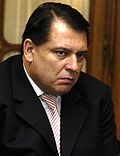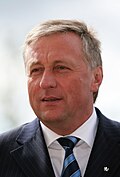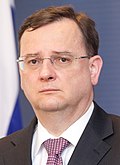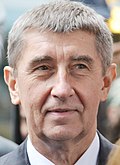| No. | Portrait | Name
(Birth–Death) | Term of office | Political party | Cabinet | Election |
|---|
| Took office | Left office | Tenure |
|---|
| 1 |  | Václav Klaus
(born 1941)
[1] [2] | 1 January 1993 | 4 July 1996 | 5 years, 1 day | Civic Democratic Party | I | ODS – KDU-ČSL – ODA – KDS | 1992 |
|---|
| 4 July 1996 | 2 January 1998 | II | ODS – KDU-ČSL – ODA | 1996 |
| 2 |  | Josef Tošovský
(born 1950)
[3] | 2 January 1998 [a] | 22 July 1998 | 201 days | Independent | I | ODS – KDU-ČSL – ODA
ODS later replaced by US |
|---|
| 3 |  | Miloš Zeman
(born 1944)
[4] | 22 July 1998 [b] | 15 July 2002 | 3 years, 358 days | Czech Social Democratic Party | I | ČSSD | 1998 |
|---|
| 4 |  | Vladimír Špidla
(born 1951)
[5] | 15 July 2002 [c] | 4 August 2004 | 2 years, 20 days | Czech Social Democratic Party | I | ČSSD – KDU-ČSL – US–DEU | 2002 |
|---|
| 5 |  | Stanislav Gross
(1969–2015)
[6] | 4 August 2004 [d] | 25 April 2005 | 264 days | Czech Social Democratic Party | I | ČSSD – KDU-ČSL – US–DEU |
|---|
| 6 |  | Jiří Paroubek
(born 1952)
[7] | 25 April 2005 | 4 September 2006 | 1 year, 132 days | Czech Social Democratic Party | I | ČSSD – KDU-ČSL – US–DEU |
|---|
| 7 |  | Mirek Topolánek
(born 1956)
[8] [9] | 4 September 2006 [e] | 9 January 2007 | 2 years, 246 days | Civic Democratic Party | I | ODS | 2006 |
|---|
| 9 January 2007 [f] | 8 May 2009 | II | ODS – KDU-ČSL – SZ |
| 8 |  | Jan Fischer
(born 1951)
[10] | 8 May 2009 [g] | 13 July 2010 | 1 year, 66 days | Independent | I | ODS – ČSSD – SZ |
|---|
| 9 |  | Petr Nečas
(born 1964)
[11] | 13 July 2010 [h] | 10 July 2013 | 2 years, 362 days | Civic Democratic Party | I | ODS – TOP 09 – VV
VV later replaced by LIDEM | 2010 |
|---|
| 10 |  | Jiří Rusnok
(born 1960)
[12] | 10 July 2013 [i] | 29 January 2014 | 203 days | Independent | I | ČSSD [13] – KDU-ČSL
ČSSD exited cabinet [14] |
|---|
| 11 |  | Bohuslav Sobotka
(born 1971)
[15] | 29 January 2014 [j] | 13 December 2017 | 3 years, 318 days | Czech Social Democratic Party | I | ČSSD – ANO 2011 – KDU-ČSL | 2013 |
|---|
| 12 |  | Andrej Babiš
(born 1954)
[16] [17] | 13 December 2017 [k] | 27 June 2018 | 4 years, 4 days | ANO 2011 | I | ANO 2011 | 2017 |
|---|
| 27 June 2018 [l] | 17 December 2021 | II | ANO 2011 – ČSSD |
| 13 |  | Petr Fiala
(born 1964)
[18] | 17 December 2021 [m] | 15 December 2025 | 3 years, 363 days | Civic Democratic Party | I | Spolu (ODS – KDU-ČSL – TOP 09) – PirStan (STAN – Pirates)
Pirates exited cabinet | 2021 |
|---|
| (12) |  | Andrej Babiš
(born 1954)
[19] [20] [21] | 15 December 2025 [n] | Incumbent | 29 days | ANO 2011 | III | ANO 2011 – SPD – AUTO | 2025 |
|---|

























